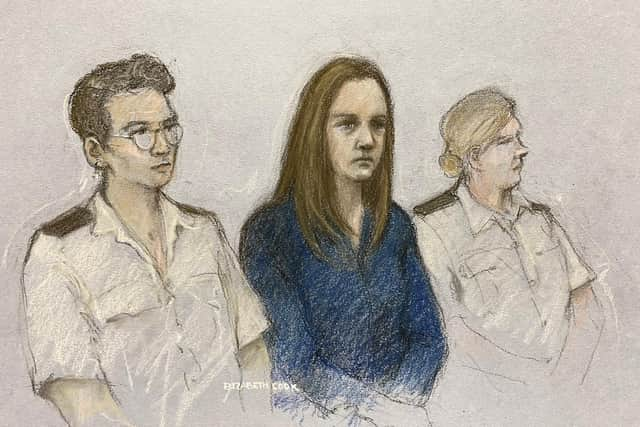Lucy Letby jury: jurors at killer nurse trial break down in tears during verdict - do they have aftercare
and live on Freeview channel 276
Jurors were in tears as the final verdicts in Lucy Letby’s murder trial were delivered, after a gruelling months-long trial in which they sat through days of testimony about the brutal ways that Letby killed and attempted to kill babies at the neonatal ward where she worked.
One juror was discharged earlier this month for ‘good personal reasons’, leaving 11 jurors to return verdicts on Letby’s charges.
Advertisement
Hide AdAdvertisement
Hide AdAfter final verdicts were returned on Friday (18 August), Letby was found guilty of seven counts of murder and and six counts of attempted murder. On Monday she was sentenced to a whole life order by Mr Justice Goss, and will spend the rest of her life in prison.
Now, with the trial complete and the jurors dismissed, the men and women who sat through months of potentially traumatic court sessions will be expected to return to their lives before the trial took place.
Yet there is little aftercare in place to ensure that the jurors, some of whom were brought to tears by the trial, do not suffer mental health issues going forward.


Why did jurors cry during the Lucy Letby trial?
Several members of the jury cried during the final v verdicts of Lucy Letby’s trial on Friday. The jury spent 11 days deliberating and giving verdicts on different charges, including eight counts of murder and 10 counts of attempted murder.
Advertisement
Hide AdAdvertisement
Hide AdIn total, the jury, made up of seven men and four women, deliberated for more than 110 hours over the 11 day period.
After the second batch of verdicts had been announced on 11 August, Letby refused to present herself at court for the remainder of the proceedings, including her sentencing hearing which took place on 21 August.
The jury could not reach a decision on six counts, but Letby was ultimately found guilty of seven counts of murder and six counts of attempted murder.
As the final verdicts were delivered on 18 August, some jurors wept whilst others held their heads in their hands. They had sat through 145 days of court trials, and the judge, Mr Justice Goss, excused them all from further jury service for the rest of their lives.
Do jurors get paid for jury service?
Advertisement
Hide AdAdvertisement
Hide AdJurors do not get paid for taking part in jury service, but they can claim a loss of earnings allowance from the court if jury service causes them to miss out on pay for their job.
Jurors can claim up to £64.95 per day for loss of earnings in addition to £5.71 per day for a food and drink allowance, and further expenses for travel to and from the court. Employers can top up their employee’s allowance so they don’t miss out on pay, but this is not mandatory.


Employees are not required to pay staff who are absent for jury service, but they cannot discriminate against them for taking part in it.
Lucy Letby’s trial, which lasted for 145 days, is one of the longest in UK history, and if any of the jurors involved earn more than could be claimed through the loss of earning allowance, and if their employers did not subsidise their pay, they may have lost out on a considerable sum of money.
Do jurors receive aftercare?
Advertisement
Hide AdAdvertisement
Hide AdJurors are receiving insufficient mental health support, according to CiC Wellbeing CEO, Kate Nowlan. She said that implementing resilience and well-being training, and following up with jurors, especially after difficult cases is ‘absolutely crucial’.
A spokesperson for the Criminal Bar Association said: “Assistance available for the judiciary and court staff is often inadequate. No specialist help is provided by the criminal justice system for jurors. Court staff are not given training to recognise signs of trauma in jurors, and there is a risk that jurors who are being deeply affected by their task may fall through the net.”
